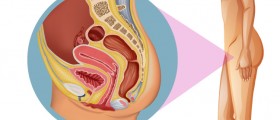
Hormone replacement therapy is also known as HRT. It has been in use for several decades, but only recently researches proved that there are significant risks associated with this treatment. HRT can be used as the therapy for different menstrual disorders and especially menopause. In general, menopause occurs in women in their 50s and 60s, but it can also be noticed earlier in life.
About Hysterectomy
Hysterectomy is surgical procedure for removal of the uterus in cases where there is some complication in the reproductive system requiring surgery. The cause for this procedure may also be some uterine fibroids or fibroid tumors.
This process may be very challenging for the patients and women have to be prepared physically and psychologically to changes after hysterectomy. One of the problems these women may encounter is surgical menopause. Although these patients may not be old enough to experience menopause, hysterectomy procedure is known to trigger this period and all its effects. That’s when HRT is also used, to treat hot flashes, irritability, forgetfulness, dry eyes, fatigue and all other symptoms that may arise and be associated with surgical menopause.
Hormone Replacement Therapy after Hysterectomy
In HRT after hysterectomy doctors commonly use estrogen and progesterone hormones. However, this is synthetic, artificial progesterone, known as progestins. Women may receive estrogen alone or combination of estrogen and progestins.
There is also something known as bioidentical HRT, where hormones derived from the plants are prepared in the laboratories. Another treatment option is therapy with compounded bioidentical hormones, same as the hormones produced in human body. Both of these HRTs have been discovered to be more beneficial than standard HRT.
Adverse Effects
Use of HRT in these cases may also be linked to several adverse effects, reported by the patients using hormones. Many women have reported headaches, weight gain, hair loss, osteoporosis, high blood pressure and anxiety or depression after using HRT. Type of hysterectomy and age of the patient are found out to affect the severity of these symptoms. As the studies revealed, women who had to have hysterectomy before their natural menopause may experience more unwanted symptoms than the other patients.
Sexual Life after Hysterectomy
Hysterectomy may significantly affect sexual life of women, provoking loss of sexual drive, vaginal dryness and painful intercourse, but these symptoms don’t appear in all patients. In fact, some of these problems may be linked more to psychological than to physical factors and can be overcome. Hysterectomy could be responsible for huge amount of stress and trauma and these patients require support from their partner and family in order to get over this problem.

















Your thoughts on this
Loading...